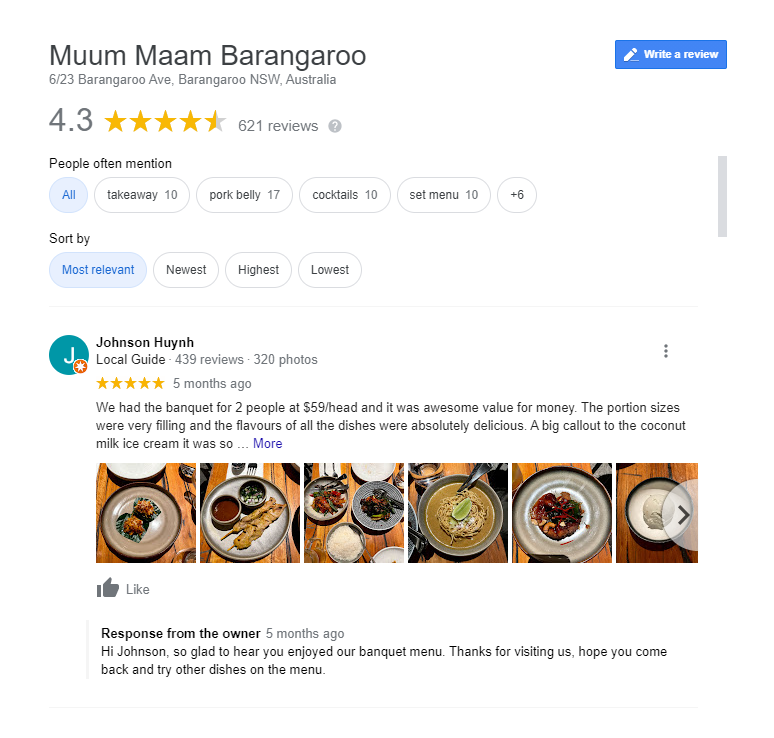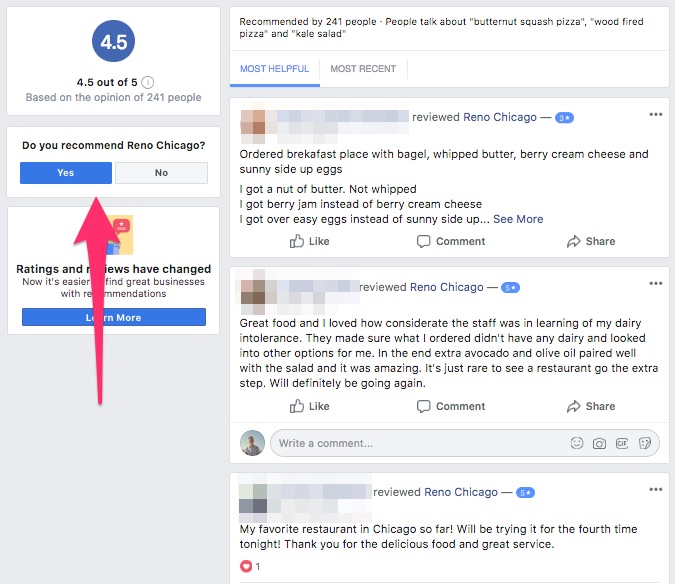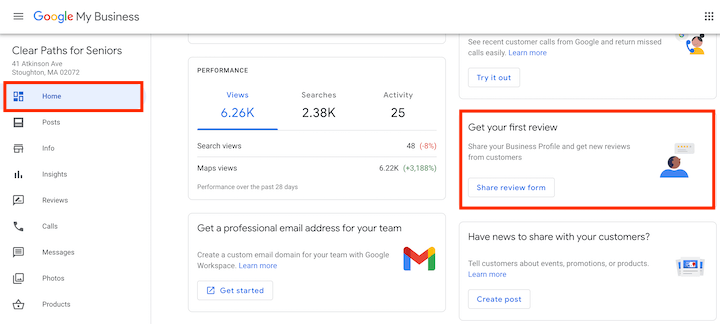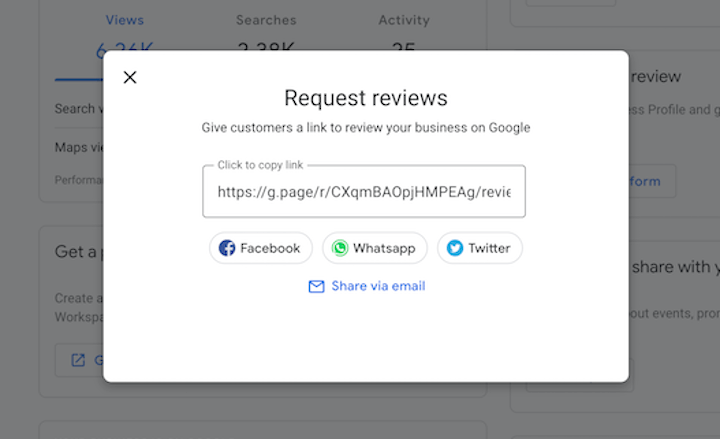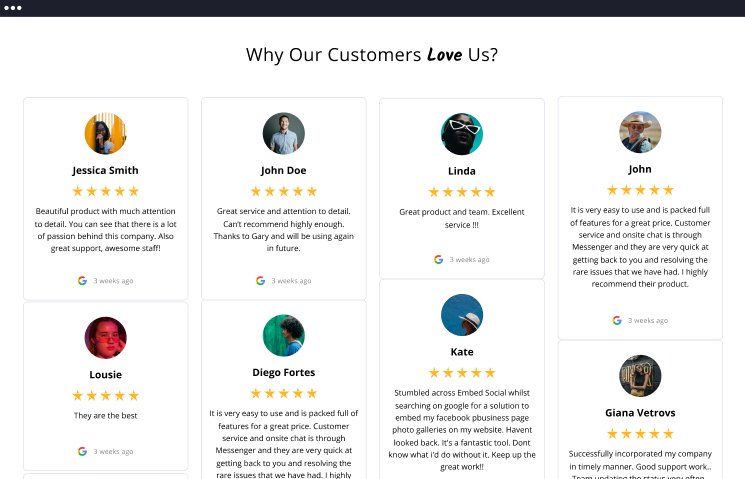How to get more Facebook and Google reviews for your clients
Never before have Facebook and Google reviews played such an important role in how customers buy things.
Even before the pandemic hit, local businesses that didn’t have an online presence were struggling to get customers through the door.
But COVID-19 has accelerated the need for small and medium businesses (SMB) to invest in their digital strategy, a key component of which is online reputation management and reviews.
This is especially true given Salesforce found nearly 60 percent of consumers will do more online shopping after the pandemic than they did before.
What the data says
Overlay that with the following data compiled by Oberlo and a separate study by PowerReviews:
- More than half of online shoppers (55 percent) read at least four product reviews prior to making a purchase. (Bizrate Insights, 2021).
- 79 percent of consumers trust online reviews as much as they do personal recommendations from friends and family (BrightLocal, 2020).
- 82 percent of consumers consult online reviews to find out more about local businesses (BrightLocal, 2019).
- 77 percent say the average star rating is one element they consider, but 52 percent don’t trust star ratings without accompanying review content (PowerReviews, 2021).
- 71 percent consider recency when reading reviews. In fact, one-third of consumers want to see reviews that are between a week and a month (PowerReviews, 2021).
Online reputation is emerging as a big opportunity
The data underscores not only are more people buying products online, but they need to be happy with a local business’s online reputation and see fresh Facebook and Google reviews before making a purchase.
Vendasta Product Marketing Manager Paige Sutherland says she is receiving increasing feedback from agencies whose SMB clients are awakening to the importance of online reviews.
“We’re noticing more of our partners selling reputation management solutions than ever before,” says Paige, who specializes in reputation management and customer voice services.
In the Vendasta State of the Local Business Survey 2021, online reputation management, along with website hosting and design, came up as the third most popular choice of digital tools adopted by SMBs since the pandemic. Social media and remote meetings took the top spots.
For agencies, all signs point to online reputation management and sourcing quality reviews for SMBs is becoming an exciting growth market.
Read on to learn about pain points agencies should try to solve for SMBs in the context of online reputation management, why Facebook and Google are the go-to review platforms, and 11 strategies to get more online reviews.
What pain points should agencies try to solve for SMBs?
Sutherland says a lot of small businesses don’t know where to begin when it comes to their online reputation.
“Some of our partners’ clients didn’t even know people were posting reviews about them on various websites until an agency alerted them to that fact. Many don’t have staff to monitor their online reviews,” she adds.
Given the challenges, marketing agencies have an immense opportunity to position themselves as trusted local experts by advising SMBs on the best ways to boost their collection of Facebook and Google reviews.
Agencies examining this opportunity should aim to address the following pain points for local businesses:
- Help SMB clients identify and monitor where and what is being said about their business online
- List or claim the SMB clients’ business profile on Facebook on Google (for a start)
- Give them one place to see all their online reviews
- Advise them on strategies for responding to and sourcing fresh reviews, or do it on their behalf if they don’t have time

Google and Facebook: The ‘kings’ of review platforms
Online reviews are officially a big business. So much so that beyond Google, Facebook and Yelp, there are dozens of industry-specific review websites for nearly every industry (more on this later).
But Sutherland recommends agencies begin with Google and Facebook for their clients. “Google and Facebook are the kings of review platforms. They’re the most important, and that’s purely based on their popularity and the daily traffic they receive,” she says.
The proof is in the data; ReviewTrackers found 76 percent of online reviews are submitted on either Google or Facebook, which rank among the top four review websites globally.
While Yelp and TripAdvisor are also popular, ranking as the second and third-most popular review platforms, they are known to be oriented towards the tourism and hospitality industries.
Overview of Google reviews
Google Business Profile (GBP) is a free tool for businesses to manage their online presence across Google. Businesses must create a GBP profile and verify their information to complete registration.
Once a business has created a GBP profile, visitors can post reviews. Google reviews will show up in two prominent places:
- Google Search - If a business has a GMB listing, customers searching online by their name or by local search can see their listing, star ratings and any reviews directly in search results.
- Google Maps - Since Google Business Profile listings are connected to Google Maps, whenever someone searches for a place, clicks on a location or types “food near me” or “doctors in my area” as an example, they can see Google reviews for one or multiple local businesses along with the address and location.
Below is an example of what a Google reviews page looks like.
Overview of Facebook reviews
For years, Facebook business pages featured traditional online reviews and ratings.
This changed in 2018 when the social network rolled out a series of visual changes and features that included “Facebook Recommendations”. Now, a query field appears on a business page’s “Recommendations and Reviews” section with the question: “Do you recommend (business name)?”.
Users can answer by pressing the “Yes” or “No” button (you will still be able to see ratings on older Facebook Business pages) and can add further context to their recommendations with tags, photos, and comments in the text. Below is an example of what a Facebook reviews page looks like.
11 strategies to get more online reviews on Google and Facebook
Now that you understand the impact of reviews on your clients’ online reputation, search engine optimization (SEO) performance and, subsequently, their bottom line, it’s time to work with them on getting more Facebook and Google reviews.
The strategies below, provided by experts, will help you do just that.
1. Consider an email or text automation strategy to source reviews
Emails and texts are a great way to source reviews, especially in cases where the shopping experience is conducted entirely on an ecommerce website and there is no way to ask for a review in person.
“Most people check their emails and text messages. But again, make sure you pick the best possible moment to send that automated message requesting a review,” Sutherland says.
In fact, agencies can work with their SMB clients to create a marketing automation strategy to source reviews, says San Francisco-based brand management company Brandy’s Chief Executive Officer, Mindy Luck.
For example, customers could get an automated email or text when they purchase a product or after they receive their order.
Luck emphasizes review request communications must contain direct links or the steps (mentioned above) to make it easy for customers to submit reviews.
“Make it short and personalized by using their first name, and include a direct link to your Google reviews page.”
2. Ask happy customers for a review
The easiest way to get more reviews is to ask for them, Sutherland says.
Customers will likely be receptive to providing a review immediately after they’ve completed their purchase in your store.
“A lot of people just overlook the simplest things. Ask your happy customers - and ask them at the right time. People are more receptive to leaving feedback immediately after a purchase,” she says. ‘’
“So if you can get the timing right, they’re more likely to give you a positive review.”
3. Don’t ask for five stars or a recommendation, just ask for feedback
While some business owners may be tempted to ask customers for a five-star review, Luck cautions against this approach.
“No one likes being told what to do, and if you’re begging for a five-star review, you could leave a bad taste in your customer’s mouth,” she says.
Local businesses should emphasize that honest feedback in an online review is appreciated as it helps company owners and managers identify areas for improvement.
“Explain how reviews benefit them. Although reviews benefit you, the business, they also benefit the customer. Tell customers how their review can help you improve their experience next time around,” she says.
4. Get employees involved
It shouldn’t be up to only business owners to ask for reviews. Sutherland suggests it’s a good idea to bring employees into the online review sourcing process.
“Work with your employees to facilitate asking for online reviews and create a plan on the best possible way or moment during the customer experience to ask,” she says.
Some businesses pay staff bonuses for delivering excellent customer service and obtaining glowing Facebook and Google reviews.
But as Luck mentioned previously, this doesn’t mean employees should badger customers for a good review. Instead, they should let customers know that a genuine review helps their employer know if they’re doing a good job or not.
5. Make it easy for your customers to provide reviews
The fewer clicks it takes customers to get to your Google or Facebook reviews page, the more likely they are to complete it, Sutherland says.
Customers should also feel free to choose when they want to provide a review, as they may not have the time or desire to write it in your store or until they’ve used the purchased product.
She suggests businesses employ a variety of methods to make it easy for customers, including:
- Asking customers for their email or number for marketing and review solicitation purposes
- Providing business cards or placing placards in your store which contain QR codes that link to your Google reviews or Facebook business page
Use the one-click Google reviews page hack
Boston-based online advertising company WordStream suggests agencies and business owners ought to know how to create shortcuts to help customers reach an SMB’s Google reviews page instantly.
“Luckily, Google has a tool for creating a shortcut link that enables them to get to the review section of your Business Profile in just one step,” Kristen McCormick, Senior Managing Editor at WordStream, says.
Go to your GMB account, click the Home tab, and find the "Get your first review" (or "Get more reviews") card. Click "Share review form."
Once you click on that button, Google will provide a one-click hyperlink that can take customers straight to your Google reviews page.
Simple steps to get customers to your Facebook reviews page quickly
For Facebook, unfortunately, there is no solution to get customers to your reviews page in one click. However, you can provide customers with the following simple steps when speaking to them or via a message.
For mobile:
- Go to our Facebook page
- Click ‘Recommendations’ or ‘Reviews’ on the left side of the Page.
- Click ‘Yes’ to recommend the Page or ‘No’ to not recommend it.
- Write a Recommendation describing what benefit you’ve received and why you’d recommend us.
- Click ‘Post’.
For desktop:
- Go to our Facebook page
- Click on the ‘Reviews’ tab on the left-hand side of the page.
- On the left-hand side of the page, click ‘Yes’ or ‘No’ to recommend.
- Write a recommendation describing what benefit you’ve received and why you’d recommend us.
- Click ‘Post’.
6. Use a link shortening tool
It’s a good idea to shorten the hyperlink for your Google or industry-specific website. That’s because long links are an “eyesore”, McCormick says.
Imagine if a customer saw the following in a text or email:
"Hi Fred, thanks so much for dining at Chicago Pizza and Oven Grinder Company. If you wouldn’t mind, please provide us with an online review on Google and let us know how we did.
The following services can be used to shorten URLs:
7. Link out to your Google reviews on your website
If a customer wants to leave a review for a local business, the first place they're probably going to look is their website, McCormick says.
Agencies should help SMBs build a clear and clutter-free call to action that is intuitively easy to find, as with the example below:
8. Create a dedicated web page for reviews
While the above method works, McCormick says a better one is to create a dedicated landing page for online reviews on a business’s website.
“The page should contain both a call-to-action to write a review but also include existing reviews. This encourages prospects to become a customer and gives added inspiration for an existing customer to leave a review,” she says.
“You can populate your reviews page via screenshots, but ideally, you want them to be in text form. Reviews are often keyword-rich, so including them on your website in a way that Google's crawlers can ‘read’ makes for a great small business SEO strategy.”
9. Include an online review CTA in your footer
In addition to having a designated page for reviews, McCormick says SMBs may also want to include a call-to-action on their website footer, near where a business's address and contact details are usually published.
10. Ask for reviews on social media
Agencies should consider leveraging their clients’ social media platforms to source reviews. If a local business has built a strong and loyal client base, then some of their customers will likely take the time to help out from their own community.
“Platforms like Facebook have their own review system, so keep this in mind when reaching out in this regard,” McCormick says.
11. Include your Google reviews link in your email signature
Lastly, experts agree that adding a link to review websites for your business in your email signature is an easy way to ask for or get customers to notice that you’re on review platforms.
This can be particularly effective if you communicate with clients on a daily basis via email.
Beyond Facebook and Google reviews
Whether a customer is seeking opinions in search of dentists, pest controllers, therapists, marketing agencies, or even golf courses, there are specialized websites that cater to each niche. And each one will have a review section for customers to post.
You can find a large selection of them organized by business category in this handy list.
With so many review platforms to choose from, it begs the question: how many should your clients be on to effectively showcase their online reputation? Sutherland encourages agencies to recommend at least one industry-specific platform to their SMB clients.
That’s because those websites solicit more specific online reviews and ask users to provide a variety of ratings - rather than one - covering elements such as value for money, employee friendliness and location.
“People might trust some of those niche review sites a bit more than Google or Facebook, or they’re looking for reviews and ratings which offer a level of detail that’s deeper,” she says.
Isn’t being listed on one review website enough?
In short, no.
Sutherland emphasizes a business’s presence on multiple platforms is likely to yield better SEO performance, thus giving shoppers more confidence about spending money with that local business.
“Without making it overwhelming, your client is better off being on multiple websites. That, in conjunction with having more reviews and having the business name mentioned in review content, will likely lead to higher rankings in search results,” she says.
Conclusion
In a post-pandemic world, it is imperative that agencies make online reviews an essential part of their SMB clients’ overall business strategy.
- The evidence is clear: the number, quality, and recency of a local business’s online reviews dictate whether or not they provide a quality service.
- Online reviews not only help with customers’ purchase decisions, but they benefit a company’s SEO performance.
- Agencies should ensure their clients are listed on Facebook and Google at the very minimum and pick at least one industry-specific review website.
- Take the time to understand how to get more reviews on Google, Facebook, and other websites for your clients.
- Make the process as easy as possible with direct links, and don’t be scared of asking for honest feedback via a review.
Next month, we’ll look at best practices for responding to reviews and share hacks on improving SEO performance by including keywords in review content.


